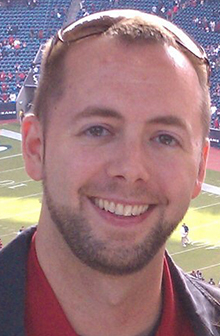Sandia computing researcher Tim Wildey wins DOE Early Career Research Program Award

Tim Wildey has received a 2017 Early Career Research Program award from the DOE Office of Science.
“Tim is the first Sandia winner of the Advanced Scientific Computing Research branch of the prestigious program,” says manager Daniel Turner.
The national award, now in its eighth year, provides researchers a grant of $500,000 yearly for five years. Its intent is “to identify and provide support to those researchers early in their careers who have the potential to develop new scientific ideas, promote them, and convince their peers to pursue them as new directions,” according to an Office of Science reply to “Frequently Asked Questions.”
Tim’s proposed research seeks to develop data-informed multiscale modeling and simulation that will be mathematically consistent and more robust than current practices.
His research over the past few years has focused on developing mathematical and computational frameworks that quantify the amount of uncertainty present in a problem. That uncertainty is then included in his mission-related modeling and simulation.
Tim anticipates that using complex multiphysics applications to inform high-consequence decisions will require moving beyond forward simulation — the practice of assuming all a model’s input parameters are known and then using the model to make predictions about objects of interest.
“Moving beyond forward simulation means that we no longer assume that we precisely know these model inputs and we instead seek to infer information about them from experimental data,” he says.
“Many problems in materials science, subsurface flow and mechanics, and magnetohydrodynamics are best described by multiphysics, which involves multiple physical models or multiple physical phenomena, and multiscale models,” he says. “These problems are challenging to simulate because they incorporate detailed physical interactions across a wide range of length and time scales. This research will pursue mathematically rigorous and computationally efficient approaches for predicting the properties and behavior of realistic, complex multiphysics applications.”
His proposed integration of advances in numerical discretization, uncertainty quantification, data assimilation, and model adaptation should result in models that can better predict outcomes.
Says Tim, “This project integrates some of that foundational work with ideas we’ve been exploring at Sandia to benefit a wide range of mission applications that support the science and national security missions of Advanced Scientific Computer Research and the DOE.”
Tim joined Sandia in January 2011 after a postdoctoral fellowship at the University of Texas at Austin and receiving a master of science and doctorate at Colorado State University, and a bachelor’s degree at Michigan State University, all in mathematics.
DOE Early Career grants are available in the program areas of advanced scientific computing research, biological and environmental research, basic energys ciences, fusion energy sciences, high energy physics, and nuclear physics.